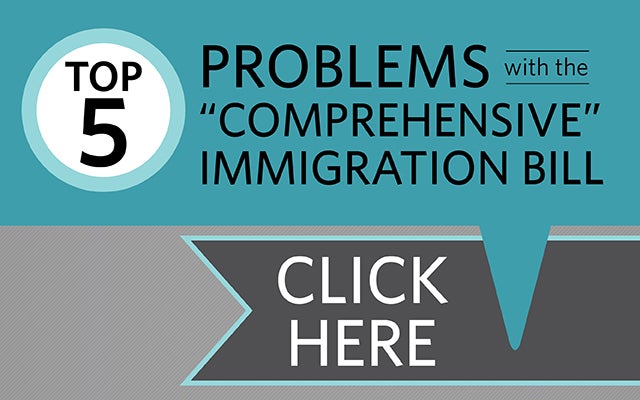We’re taught from a young age to “wait your turn” and “don’t cut in line,” but what about when we take those lessons from the playground to real life? For close to 4.5 million people waiting in line to come to the U.S. today, this is a very real question.
Indeed, if some in Congress get their way, roughly 11.5 million illegal immigrants would get to jump the line ahead of law-abiding immigrants simply because they are already here illegally. If granted amnesty, these people—who broke the law to come into the U.S.—could jump over the 4,412,693 that are still waiting for immigrant visas to come to the U.S.
And this doesn’t even account for those who will enter the legal immigration system in the future.
This is hardly fair. Going through the legal immigration system is often a difficult and time-consuming process. Take the example of my colleague Doug and his fiancée, Magdiel. Told the overall processing time to obtain a fiancé visa would be a total of eight months, Doug and Magdiel had to wait six months after Magdiel submitted her application before it was even approved and forwarded to the U.S. embassy in Guatemala.
When the embassy finally e-mailed to set up an interview, they got Magdiel’s name completely wrong, addressing her as Francisco Castro. The worrisome issue was resolved after numerous phone calls. Magdiel then had to go to two different banks in order to find one that would let her pay the embassy visa fee. Many months later, the process still is not complete, and both of their frustrations have grown.
Sadly, Doug and Magdiel are not the only ones having this experience, nor is theirs anywhere near the worst. Indeed, some people have been waiting a staggering 24 years to obtain a visa. If anything, this fact points to the need for reform in our nation’s immigration system. At the same time, however, it also serves as a reminder that any meaningful solution, must not only be fair and compassionate, but respect the rule of law.
This means finding solutions that work to prevent unlawful immigration, rather than encourage it. At the same time, however, it also means fostering key reforms to encourage lawful immigration, such as streamlining the current visa system, enhancing avenues for the entry of skilled workers, and fostering targeted temporary worker programs to ensure American employers can get the labor they need.
The goal of Americans and immigrants alike is the American Dream. To secure that dream for as many people as possible, the immigration system needs to be reformed to reward those who work hard and play by the rules.
Sarah Friesen is currently a member of the Young Leaders Program at The Heritage Foundation. For more information on interning at Heritage, please click here.





























